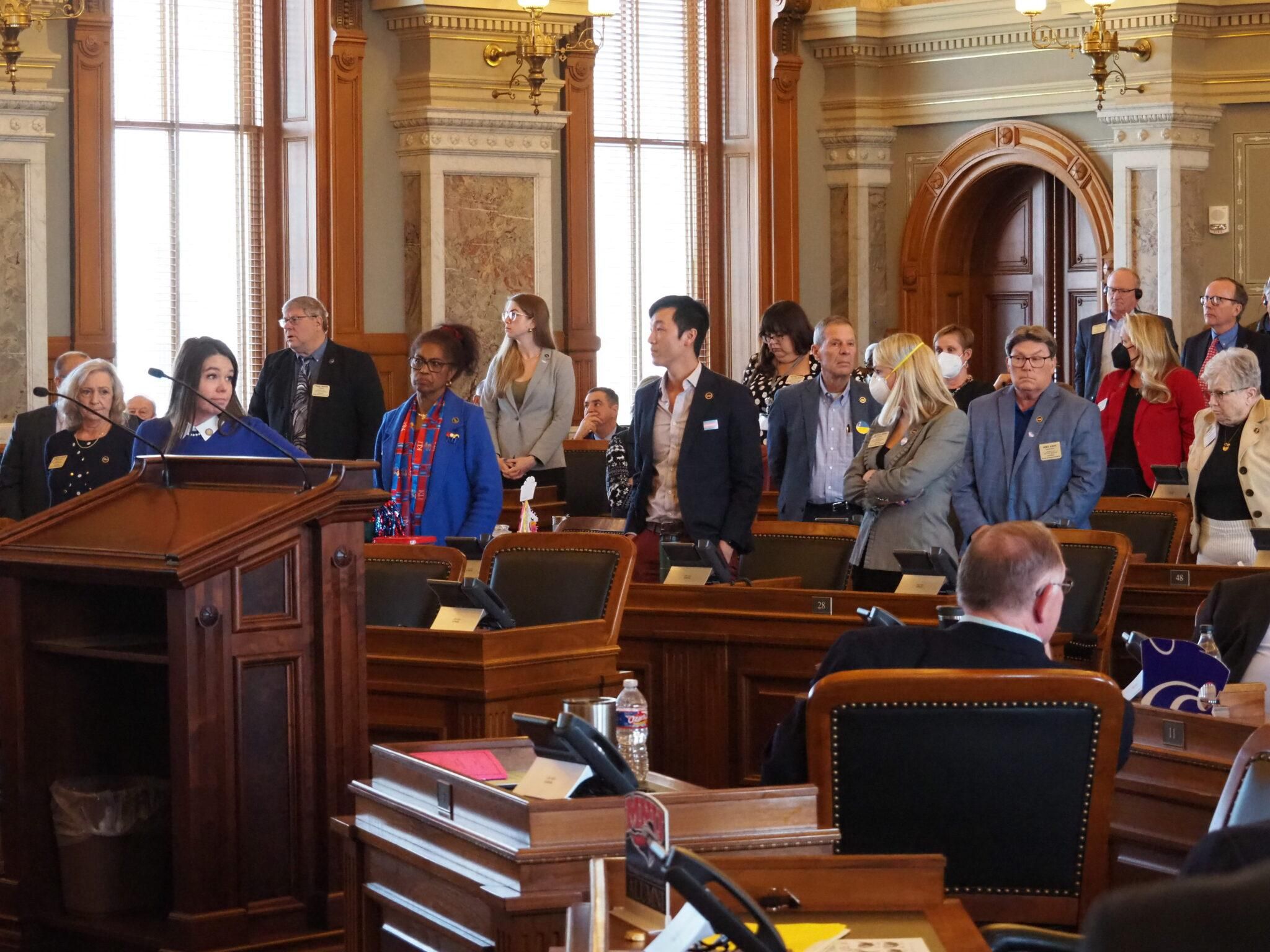TOPEKA — Rep. Linda Featherston resisted until forced to cast a vote Friday on a bill expanding hospital and nursing home immunity from lawsuits tied to the COVID-19 pandemic that was merged with provisions difficult for the Democrat to support.
In an unusual procedural move, House Republicans struggling to find the minimum 63 votes among 125 representatives for the bundle known as Senate Bill 286 voted to reject Featherston’s request to be allowed to abstain. House Speaker Ron Ryckman asked her repeatedly to press a “yes” or “no” button at her desk. She tried to avoid eye contact with Ryckman.
Featherston had taken the lead in assembling a House bill to increase criminal penalties for people convicted of interfering with activities of a hospital and of assaulting a hospital employee. Those policy pieces were, to her regret, blended with broadened and extending until January 2023 pandemic-related policies associated with civil immunity of hospitals and nursing homes treating COVID-19 patients.
She tried, but failed, to have the bill sent back to a House-Senate committee for revision. She also asked permission of House colleagues to allow her to vote “present” on the bill containing provisions she admired and provisions she loathed. In a vote requiring members to stand in support of her plea or remain seated if opposed, she was ordered to cast a vote for or against the bill.
If Featherston refused to vote as a form of protest, she risked being reprimanded, censured or expelled by the House.
“As I talk to friends on both sides of the aisle in this chamber,” said Featherston, an Overland Park Democrat, “I hear the phrase a lot: ‘Can’t we just do one good thing without messing it up?’ Can we not just stand for the people and for what is right once, without linking it to something that causes so many of us distress?”
She said her priority was to stand with 70% of emergency room nurses and 50% of emergency room physicians who reported being assaulted at work.
As it turned out, Featherston ended up casting a “yes” vote that was the 63rd in favor of the bundled legislation — the fewest required for passage in the House. The final tally in the House was 64-51, with Republicans and Democrats opposed. It cleared the Senate on a vote of 24-16. That sent the bill to Gov. Laura Kelly’s desk.
“This took quite a bit of effort to get to a spot where both the Senate and House cold come to an agreement,” said Rep. Brad Ralph, R-Dodge City.
Rep. John Carmichael, D-Wichita, said the bill had been “held hostage” to create a path to insert expanded immunity from COVID-19 lawsuits requested by the Kansas Hospital Association. He said the organization was anxious that hospitals would be targeted with lawsuits over decisions on use of ivermectin or hydroxychloroquine or on vaccination status.
“Many lawyers much brighter than I am actually believe that those tweaks may have expanded the immunity given to hospitals and other health care providers to the extent that it goes far beyond even COVID-related matters, and could result in essence in a prohibition against most medical malpractice litigation for injured patients over the next 10 months,” said Carmichael, who voted against the bill.
Across the rotunda, Sen. Mark Steffen, a Republican from Hutchinson and an anesthesiologist, urged his colleagues to oppose the bill. He said the immunity provisions would allow hospitals to “lower their quality of care” under guise of a pandemic that should be declared over.
“The faith in our hospitals in the area has dramatically diminished when people get COVID,” Steffen said. “The last place they want to go is the hospital. Things are upside down. By voting no on this bill, we have the opportunity to start to right the ship.”
Several House Republicans also opposed the package after expressing concerns about access to ivermectin — which studies repeatedly show provides no benefit to preventing or treating COVID-19, the disease that has killed 8,397 Kansans and sickened one-fourth of the state’s population in the past two years.
Rep. Michael Houser, R-Columbus, described his personal battle with the virus. He falsely claimed ivermectin has been proven to lessen disease “from taking you down” and said he couldn’t find a doctor in all of Cherokee County who would give him the drug. Houser said he was told “we can’t give that to you” because it was against hospital protocol.
“I firmly believe that if I had not fallen through that gap, and I’d had somebody that would prescribe that for me early on in the stage, I wouldn’t have missed three weeks of session, and I still wouldn’t be huffing and puffing when I walk from my truck to the elevator,” Houser said.
Rep. Pat Proctor, a Leavenworth Republican, said he voted against the bill because he wasn’t going to participate in “perpetuating the lie that we are still in a ‘COVID-19 emergency.’ ”
“This lie has been used to destroy lives,” he said. “It has been used to destroy livelihoods. It needs to end. And it won’t end until we sunset all of the emergency measures, including this legal immunity.”
Eighteen House Democrats signed a statement in opposition of the bill because they believed it went too far beyond the reform crafted by Featherston.
Kansas Reflector is part of States Newsroom, a network of news bureaus supported by grants and a coalition of donors as a 501c(3) public charity. Kansas Reflector maintains editorial independence. Contact Editor Sherman Smith for questions: info@kansasreflector.com. Follow Kansas Reflector on Facebook and Twitter.
